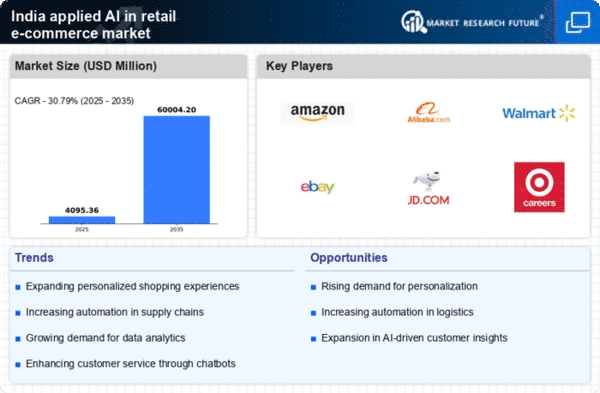Supply Chain Optimization
Supply chain optimization is a pivotal driver in the applied ai-in-retail-e-commerce market. AI technologies facilitate real-time tracking and management of inventory, leading to reduced operational costs and improved efficiency. In India, the logistics sector is expected to reach $215 billion by 2025, with AI playing a significant role in streamlining processes. Retailers can utilize predictive analytics to forecast demand accurately, minimizing stockouts and overstock situations. This optimization not only enhances customer experience but also contributes to sustainability efforts by reducing waste. As such, the integration of AI in supply chain management is becoming increasingly essential for retailers.
Dynamic Pricing Strategies
Dynamic pricing strategies are gaining traction within the applied ai-in-retail-e-commerce market. Retailers are employing AI algorithms to adjust prices in real-time based on market demand, competitor pricing, and consumer behavior. This approach allows businesses to maximize revenue while remaining competitive. In India, the e-commerce sector is projected to reach $200 billion by 2026, and dynamic pricing could play a crucial role in this growth. By leveraging AI, retailers can implement personalized pricing strategies that cater to individual customer segments, thereby enhancing sales and customer satisfaction. This driver highlights the importance of adaptability in pricing models.
Enhanced Customer Insights
The applied ai-in-retail-e-commerce market is experiencing a surge in demand for enhanced customer insights. Retailers are increasingly leveraging AI technologies to analyze consumer behavior, preferences, and purchasing patterns. This data-driven approach allows businesses to tailor their offerings, thereby improving customer satisfaction and loyalty. In India, the market for AI-driven analytics is projected to grow at a CAGR of 30% from 2023 to 2028. By utilizing AI, retailers can gain a competitive edge, as they can predict trends and adapt their strategies accordingly. This driver is crucial for businesses aiming to thrive in a rapidly evolving retail landscape.
Improved Customer Engagement
Improved customer engagement is a vital driver in the applied ai-in-retail-e-commerce market. AI technologies facilitate personalized communication and interaction with consumers, enhancing their shopping experience. Retailers are utilizing chatbots and virtual assistants to provide instant support and recommendations, which can lead to increased sales. In India, the chatbot market is projected to grow to $1.3 billion by 2025, indicating a strong shift towards AI-driven customer service solutions. By fostering deeper connections with customers, retailers can boost brand loyalty and retention. This driver emphasizes the role of AI in creating meaningful customer relationships.
Fraud Detection and Prevention
Fraud detection and prevention represent a critical driver in the applied ai-in-retail-e-commerce market. With the rise of online transactions, retailers face increasing risks of fraudulent activities. AI technologies enable businesses to analyze transaction patterns and identify anomalies in real-time, significantly reducing the potential for fraud. In India, the digital payment market is expected to reach $1 trillion by 2025, making robust fraud prevention measures essential. By implementing AI-driven solutions, retailers can protect their revenue and build trust with consumers. This driver underscores the necessity of security in the digital retail environment.
















